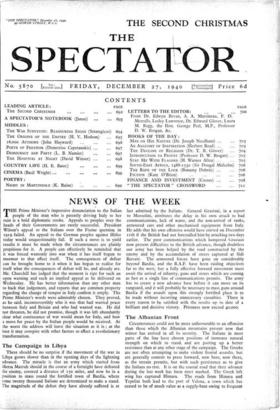The Albanian Front
Circumstances could not be more unfavourable to an offensive than those which the Albanian mountains present now that winter has arrived in all its severity. The Italians in most parts of the line have chosen positions of immense natural strength on which to stand, and are putting up a better resistance than at any other stage of the campaign. The Greeks are not often attempting to make violent frontal assaults, but are generally content to press forward, now here, now there, as the terrain permits, but with such persistence as to give the Italians no rest. It is on the coastal road that their advance during the last week has been most marked. The Greek left wing has captured Himara. The roads from Himara and Tepelini both lead to the port of Valona, a town which has ceased to be of much value as a supply-base owing to frequent a lentions of the R.A.F., and more recently the heavy bombard- ment it suffered from the guns of British battleships. That these capital ships should have penetrated through the Straits of Otranto into the Adriatic to attack Valona is an indication of the radical chang:. in the character of the Mediterranean war since the victories won by the Greeks and the British on land, in the air, and on or from the sea. Three months ago it would have been considered the height of imprudence to send British capital ships into the Italian preserve of the Adriatic. But now the diminished Italian fleet exists only by hiding, and British aircraft operating from Greek soil can work in conjunction with a British fleet in Italian home waters.



























